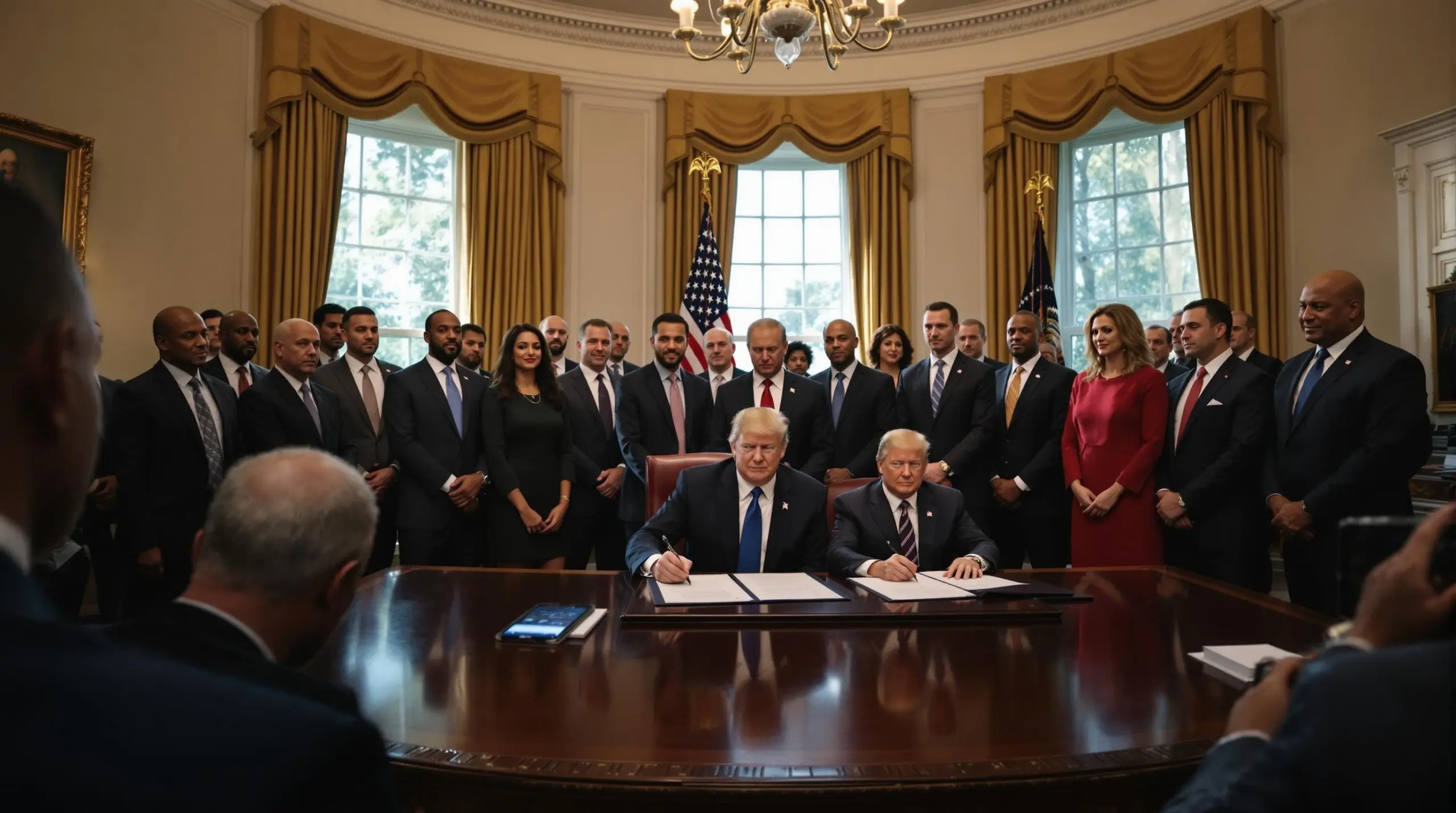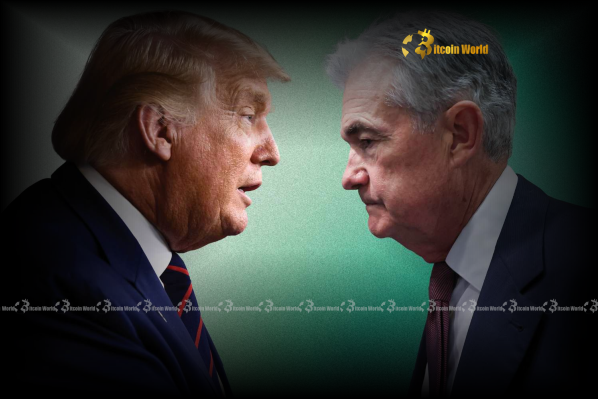BitcoinWorld
![]()
Semiconductor Tariffs: Urgent Uncertainty Looms Over US Tech Industry
The cryptocurrency market often mirrors the broader economic landscape, and the latest news from the tech sector is sending ripples. President Donald Trump’s recent announcement regarding upcoming semiconductor tariffs is poised to create significant shifts, impacting not only the hardware and AI industries but potentially influencing investor sentiment across the digital asset space. This move adds another layer of complexity to an already dynamic global supply chain, prompting a closer look at what these tariffs could mean for the future of technology and innovation.
Understanding the Proposed Semiconductor Tariffs
The year has been a whirlwind for the semiconductor industry, and the rollercoaster ride is far from over. Speaking on CNBC’s Squawk Box, President Trump revealed plans to announce new tariffs on semiconductors and chips as early as next week. While the specifics remain under wraps, the mere prospect of such tariffs has sent a tremor through the U.S. hardware and AI sectors. This potential policy shift could significantly alter the cost structures and supply chains for companies heavily reliant on these critical components.
Historically, the U.S. has aimed to bolster its domestic chip production. The 2022 signing of the CHIPs and Science Act, which allocated a substantial $52 billion in subsidies, was a direct response to the U.S. producing only about 10% of global chips despite housing over half of the world’s semiconductor companies. The proposed semiconductor tariffs could be seen as another lever to encourage domestic production, but they also carry the risk of increasing costs for American businesses that import chips.
The Shifting Landscape of AI Chip Export Rules
Beyond tariffs, the industry is also grappling with evolving regulations around AI chip export restrictions. These rules dictate which countries can acquire advanced semiconductors vital for artificial intelligence systems. The Trump administration had previously rescinded the Biden administration’s country-specific, multi-tier approach to restricting chip exports in May. Following this, the AI Action Plan released in July underscored the necessity for the U.S. to implement chip export restrictions, though it lacked specific details.
Recent reports from Semafor, citing industry sources, suggest that the Trump administration is now deliberating whether to proceed with its original plan to fully rescind and replace Biden’s AI export rules. This ongoing uncertainty surrounding AI chip export policies creates a challenging environment for companies involved in global trade of advanced AI hardware. The implications for international partnerships and the development of AI technologies are substantial, as clarity on these rules is crucial for long-term planning and investment.
Boosting US Chip Manufacturing: Progress and Hurdles
The goal of enhancing US chip manufacturing has been a bipartisan priority, driven by national security and economic competitiveness concerns. Significant strides have been made, with major players like Intel and Taiwan Semiconductor Manufacturing Company (TSMC) receiving crucial funding from the CHIPs Act. TSMC, for instance, has committed to investing at least $100 billion over the next four years into building chip manufacturing plants within the United States.
However, the path to rapidly scaling up US chip manufacturing is fraught with challenges. Constructing and operationalizing advanced chip fabrication facilities is a time-intensive and complex endeavor. Intel’s recent announcement of further delays in the construction of its Ohio chip manufacturing facility underscores these difficulties. Despite the financial incentives, the intricate process of establishing a robust domestic supply chain requires sustained effort, skilled labor, and overcoming logistical hurdles.
Impact of Trump Tech Policy on Innovation
The broader implications of Trump tech policy extend beyond just semiconductors and chips. His administration’s approach to trade, particularly the use of tariffs, signals a potential shift towards protectionist measures that could reshape global technology supply chains. While the stated aim is often to protect domestic industries and jobs, such policies can lead to increased costs for consumers, retaliatory measures from other countries, and a slowdown in global innovation due to disrupted collaborations and increased friction.
For U.S. hardware and AI companies, these policy shifts necessitate strategic re-evaluations. They might need to consider diversifying their supply chains, investing more heavily in domestic production, or navigating a more complex regulatory landscape. The unpredictability inherent in the current Trump tech policy environment can make long-term planning challenging, impacting investment decisions and the pace of technological advancement.
Navigating the Global Semiconductor Market Disruptions
The semiconductor industry is inherently global, with intricate interdependencies across nations for design, manufacturing, and assembly. The prospect of new tariffs and evolving export controls adds significant volatility to the global semiconductor market. Companies that operate internationally, from raw material suppliers to end-product manufacturers, will need to adapt quickly to these changing dynamics. This could involve re-evaluating sourcing strategies, exploring new markets, or adjusting pricing models.
The ongoing uncertainty could also influence investment flows and M&A activities within the global semiconductor market. As companies seek stability and efficiency, we might see a realignment of alliances and supply agreements. The goal for many will be to mitigate risks associated with trade barriers while continuing to innovate and meet the burgeoning demand for chips driven by advancements in AI, IoT, and other emerging technologies.
Conclusion: A Pivotal Moment for Tech and Trade
President Trump’s impending announcement on semiconductor and chip tariffs marks a pivotal moment for the U.S. and the global tech industry. Coupled with the evolving stance on AI chip export restrictions, these policies introduce a new layer of complexity and potential disruption. While the CHIPs Act aims to bolster domestic manufacturing, the challenges of rapid scaling remain evident. The decisions made in the coming weeks and months will undoubtedly shape the future of innovation, supply chains, and international trade in the critical semiconductor sector. Companies, investors, and policymakers alike will need to navigate this uncertain terrain with agility and foresight to minimize adverse impacts and capitalize on emerging opportunities.
To learn more about the latest AI market trends, explore our article on key developments shaping AI models features.
This post Semiconductor Tariffs: Urgent Uncertainty Looms Over US Tech Industry first appeared on BitcoinWorld and is written by Editorial Team




